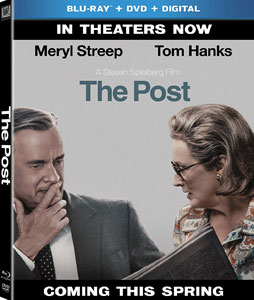One of my bosses encouraged us to attend “The Post” (2017) – which recently got a wide theatrical release – to rekindle our passion for newspapering. The film encourages some of that spirit, no doubt, but overall it left me sad. It’s a great movie about the Washington Post’s decision to publish highlights of the Top Secret Pentagon Papers in 1971, very much a welcome addition to the pantheon of journalism movies, but Steven Spielberg’s entry feels curiously out of time more so than, say, 2015’s “Spotlight.”
Of course, this is largely because it took place much longer ago, and the time period is also where a lot of its charm comes from. For newspaper geeks, it’s like pornography seeing close-up shots of pages being typeset (in the old-school sense of the term) and the press running, supplemented by tense music from John Williams underlining newspapers’ vital importance to democracy and tenuous lifespan. Spielberg might be showing off how his team reassembled the old print equipment, but I approve of it.
Additionally, the technological limits of the 1970s (compared to today) meant the public had fewer news options, and it wasn’t as easy for those outlets to report on things on the other side of the globe. The public eventually turned against the Vietnam War because it was televised, but the series of administrations that oversaw the ramping up to war were able to keep secrets. Then and now, it’s hard to report on top-secret government meetings.
But “The Post’s” melancholy disconnect also arises because the issues of 1971 aren’t controversial anymore. Kennedy, part of the chain of presidents who kept the true nature of the Vietnam War under wraps, openly says in a speech: “The world knows America will never start a war.” It’s a laugh line today because of its brazen untruth, but it also reminds us that U.S. presidents – and presidential candidates –no longer have to use anti-war rhetoric because the populace is numb to imperialism. Young voters in particular think war is a normal aspect of life; they’ve never known otherwise. “The Post’s” shots of war protests outside the Washington Post building and citizens’ placards supporting freedom of the press are breathtaking for how they’ve been relegated to the past.
“The Post” – written by Liz Hannah and Josh Singer (“The Fifth Estate”) — illuminates history and a bevy of issues, drilling all the way down to the problematic nature of publicly traded media companies. But the film works because it’s a character piece at heart: It zeroes in on Washington Post owner/publisher Kay Graham (Meryl Streep). When she walks out of the Supreme Court building, her paper’s First Amendment rights confirmed by a 6-3 vote (think about that for a second: 6-3, not 9-0), she walks past admiring young women. But she’s not Wonder Woman: Graham stammers and hesitates, and her social awkwardness peeks out beneath her cultivated grace. It’s obviously unfair to conclude that women shouldn’t be newspaper publishers, but one could make a fair assessment early in the film that Graham herself – who inherited the mantle from her late husband — isn’t qualified.

Tom Hanks, meanwhile, chews scenery with gusto as Ben Bradlee, The Post’s gruff editor. He makes me want to watch the Bradlee documentary I have on my DVR. He’s one of those newspapermen who is scary to work for if you’re a newcomer – or even a veteran like key Pentagon Papers reporter Ben Bagdikian (Bob Odenkirk). But at the same time, he’s as brash with Graham as he is with his underlings.
He’ll stand up for his reporters and the First Amendment, although “The Post” suggests he comes to a robust realization of his job’s purpose later than he should have. His wife, Tony (Sarah Paulson), looks at a photo of herself, Ben, JFK and Jackie Kennedy and says it makes her sad. Ben agrees, and it’s a great double-meaning line, as only now does Ben realize politicians are not to be trusted, and maybe aren’t even your friends, even when you think they are.
Most of the major players in Pentagon Papers case are dead now, but what really makes the film seem like a snapshot of the past is this: The good guys win this battle, but from our theater seats in 2018, we know the bad guys go on to win the war, and the bond between media and consumer is decidedly frazzled today, when journalists are ranked as a distrusted class of people.
The hopefulness of “Spotlight” — a celebration of the power of the press, even in the 21st century — is replaced in Spielberg’s film by a strong sense of “This is how it used to be, and isn’t anymore.” The film portrays an awful time period – the height of the Vietnam War, for crying out loud – yet also makes a viewer wish it were 1971 again, and that leads to a weird feeling of hopelessness.

